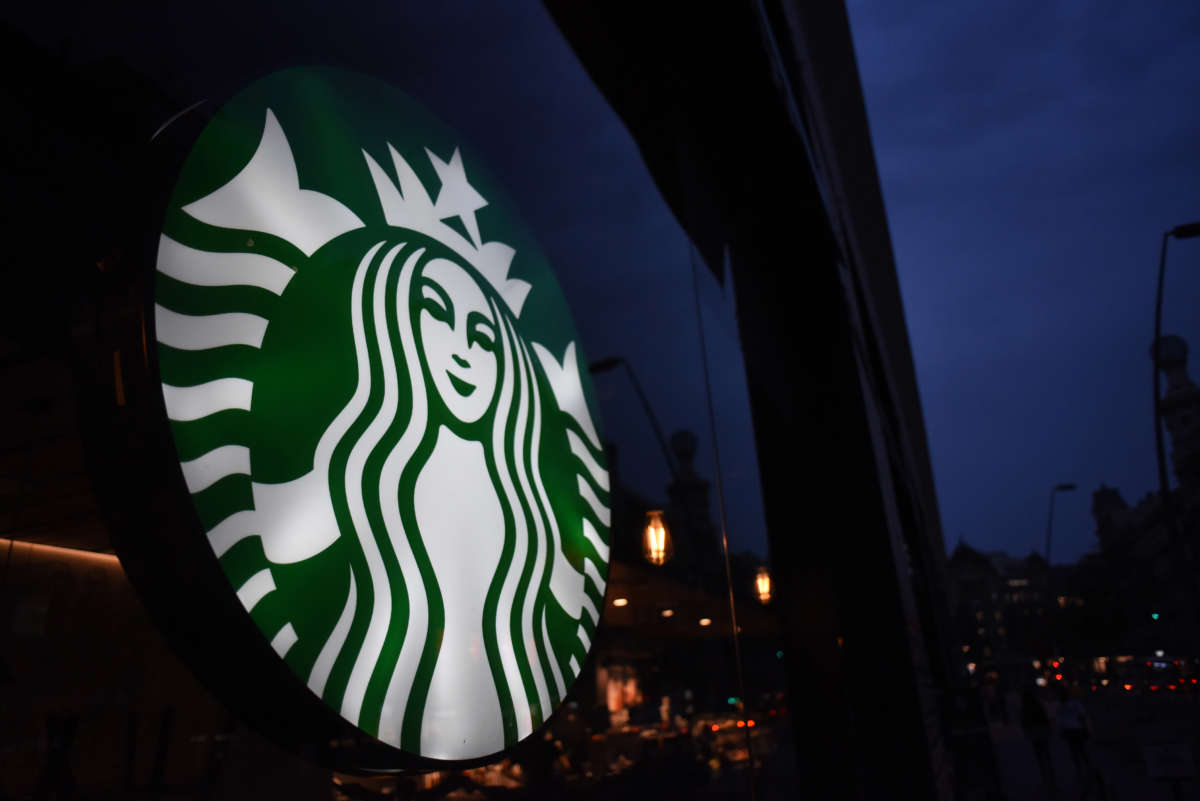Did you know that Truthout is a nonprofit and independently funded by readers like you? If you value what we do, please support our work with a donation.
On Friday, Starbucks Workers United announced that 150 stores have filed to unionize over just the past few months, marking a milestone in the rapidly growing campaign.
The Westmoreland location in Portland, Oregon, was the 150th location to file for unionization. “The Westmoreland partners are standing with their fellow Starbucks workers coast to coast,” the union wrote. “Together we – the partners – will make a better Starbucks!” Since then, several more stores have filed to unionize.
Workers have been filing to unionize nearly every day; at the end of February, the union marked its 100th store filing, meaning that an average of about two stores has filed to unionize every day over the past month. Six stores have successfully unionized so far, with more elections scheduled for the coming weeks. Only one store has voted against unionization.
Over the weekend, Starbucks workers at one store went on strike to protest what workers say are unsafe working conditions. Workers at a store in Overland Park, Kansas, say that the company has been retaliating against pro-union workers at the location, which filed to unionize earlier this year. The location recently underwent a union election.
One pro-union worker, Maddie Doran, told KCUR that the location has been understaffed and that management accused her of stealing around the time of the election, which Doran said was “clearly retaliation.”
Retaliating against pro-union workers is just one way that Starbucks has been union busting, according to the union.
Starbucks Workers United has filed over 20 complaints with the National Labor Relations Board (NLRB) against the company over the past weeks, alleging that the company has been using illegal union-busting tactics in order to quash union efforts. The company has illegally coerced workers during anti-union meetings, retaliated against and fired union organizers, and restricted workers from talking to journalists, the union says.
Recently, the union said that the company has been cutting hours for workers in order to punish pro-union workers and interfere with their organizing campaigns. A union survey of workers found that employees have had between two and 15 hours cut from their weekly schedules, which has impacted workers’ finances and potentially rendered them ineligible for benefits like health care.
The union has asked the labor board for a nationwide injunction against the company to stop it from continuing to cut hours.
“Being a single woman living on my own, I chose this job because I was promised that I would be able to maintain any hours needed in order to survive, for me, that was at least 35 hours minimum a week,” Angel Krempa, a shift supervisor in Buffalo, said in a statement earlier this month. “Since going to court to fight for my store to receive ballots, I have had to fight to get at least 35 hours, I cannot afford to pay my bills without dipping into my student loan bill account now.”
“I’m terrified I won’t be able to survive on my own much longer, for a corporation that brings in millions of dollars in revenue, I am deeply insulted and hurt, when all I’ve tried to do is bring accountability to my managers,” Krempa went on.
So far, Starbucks has been losing its legal battles against the union. Last week, the NLRB found that the company illegally retaliated against two pro-union workers in Phoenix, Arizona, firing one and suspending another. If a judge finds that Starbucks broke the law, the company will have to distribute materials about workers’ right to organize and give the fired worker back pay.
However, the company may be looking to ramp up its anti-union campaign. It recently brought back Howard Schultz to act as CEO, replacing CEO Kevin Johnson in a move that workers say was clearly due to Schultz’s anti-union history.
A terrifying moment. We appeal for your support.
In the last weeks, we have witnessed an authoritarian assault on communities in Minnesota and across the nation.
The need for truthful, grassroots reporting is urgent at this cataclysmic historical moment. Yet, Trump-aligned billionaires and other allies have taken over many legacy media outlets — the culmination of a decades-long campaign to place control of the narrative into the hands of the political right.
We refuse to let Trump’s blatant propaganda machine go unchecked. Untethered to corporate ownership or advertisers, Truthout remains fearless in our reporting and our determination to use journalism as a tool for justice.
But we need your help just to fund our basic expenses. Over 80 percent of Truthout’s funding comes from small individual donations from our community of readers, and over a third of our total budget is supported by recurring monthly donors.
Truthout has launched a fundraiser, and we have a goal to add 231 new monthly donors in the next 48 hours. Whether you can make a small monthly donation or a larger one-time gift, Truthout only works with your support.
